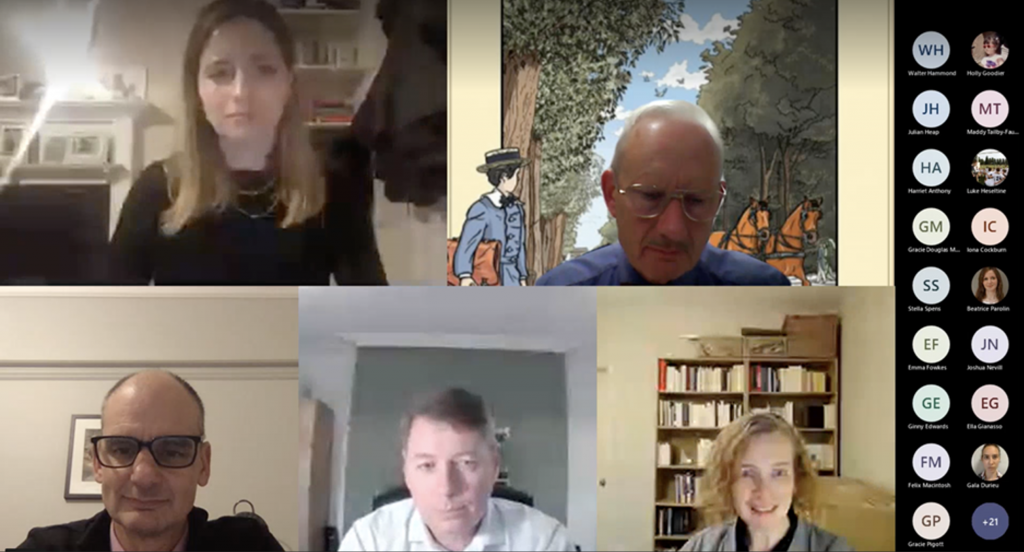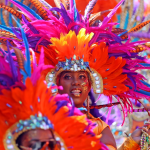
The MFL ‘Languages for Life’ Colloquium took place this year on Teams on the 2nd November. It is an annual academic seminar where a variety of panellists kindly give up their evening to talk to the polyglots of Rugby about how languages have played a role in their lives post-education. Designed to enthuse and invite the students at Rugby to pursue languages in both their studies and their personal lives, the evening saw a flurry of funny stories along with a plethora of reasons to delve deep into the world of languages.
Dr Smith asked four panellists to talk:
– Peter Nicholls, COO of Rugby School
– Ciara McKibbin, OR
– Phil Sparke, a Rugby parent
– Lucy Burns, OR
The Chairwoman for the evening was the extremely eloquent Holly Goodier, who introduced the Colloquium by talking to us about the title, ‘Languages for Life’. She spoke about the preconceived notion that one would normally leave one’s subjects behind after school and move on with life without taking them further. However, she stated that studying languages is not an ephemeral stage in one’s life but instead a long-lasting, sustainable skill. And thus, the evening began.
The first speaker of the night was Lucy, who studied German and French at Rugby and then on to Oxford to study German and English. She segued into a career at the BBC, doing audio journalism, and making news programmes for the World Service. She began her talk by describing how much she preferred German to English, and how much more stimulating and fulfilling it was. Prior to Oxford, she took a Gap year. Working in Hamburg, she illustrated the lack of glamour yet how eye-opening the experience was, especially coming from a ‘structured, sheltered environment in Rugby’. The world she was thrown into was the antithesis of where she had grown up and she loved being around people who were not brought up in the same way as her. This transformational period allowed her to realise the importance of languages. During her third year at university, she returned to Germany, to Berlin, where she studied theatre and film and admitted that it was very difficult to comprehend all the complexities of the subject in a foreign language! After graduating, she continued to work in theatre but then came back to the UK and gained a job at the BBC. She broadcasted many news stories but her first big project was the coverage of the 21st anniversary of the fall of the Berlin Wall. Then, she also made a documentary and was given the job because of her German knowledge and therefore conveyed the many more doors which languages can open for you. The skills she acquired from learning German are numerous. Her confidence and communication abilities, her research knowledge, her fluid writing, and the intercultural communication are just some of the many things she could take away from her time in Germany. During the question period, Lucy spoke about her regret at not studying more languages when she had the time, but her eager drive to learn Russian and Mandarin.
Secondly, it was Ciara. After studying French for A Level, she then studied French and Spanish (ab initio) at Bristol. Her year abroad was in Chile and France which brought about her love for travel. She now is in technology and has recently been working for high growth start-ups. Ciara began her talk by informing the audience that the way one learns languages at university is starkly different to that at school. Some topics which she enjoyed during her time at Bristol were The War on Drugs, Women’s rights, Football, Food and so many more. She demonstrated that she did not think there was another degree option which can give one so much breadth and variety. Likewise, she said that there is probably no other degree in which you can count watching Netflix as homework! Another major perk of doing a language degree for Ciara was the year abroad. It was a unanimous head-nod among all panellists when Ciara said that ‘the year abroad is the best year of your life’. In Chile, Ciara was shocked by the lack of English speakers and how little she knew about where she was going. However, she quickly adapted, and it was a very memorable and extraordinary time for her. Her languages abilities accelerated her career and like Lucy, was able to complete tasks which otherwise would have been impossible without languages. She mentioned that travelling as a woman, it is much easier and safer to know the language to communicate with the locals which gives one a totally different experience. When she was in Columbia, Ciara wanted to take a bus and was little informed about how the bus system worked. As it happened, she spent half a day at the bus stop without any coming. Instead, she ended up talking to taxi drivers and assimilated into an impromptu English lesson, and then becoming friends with them and eating meals together. She now learns Russian in her own time and has enjoyed the challenge and one day would like to read Harry Potter, The Philosopher’s Stone in Russian, as she has done in four other languages!
Next was Rugby’s very own Peter Nicholls. He initially went to work in Rome when he was working for BT, and although he did not know any Italian before, he had French A Level but managed to pick the language up after about six months, however, he mentioned that he never understood a joke for the first three years! He spoke about the difference between how he and his wife approached the language; she is very care-free and confident whereas he was rather strict and grammatically correct. Yet, the Italians revelled in his wife’s approach and with their flattery it all came together eventually. Mr Nicholls spoke about his mindset change and how his cultural awareness shifted quickly. The reputation in Italy is that people like to do things in a rather disorganised fashion, but in the UK, we are more structured and planned. Mr Nicholls conveyed that everything comes together in the end thus, it is just different elsewhere, not wrong. Another lesson he learnt is that the more one puts in, the more one gets out. Mr Nicholls put time into learning the language and consequently befriended his Italian colleagues which allowed him to travel through more of the country and explore the continent-likeness of the country. Mr Nicholls also touched upon making one’s own luck. He expanded on it by implying that whatever path one takes, one must pursue each possibility with the greatest enthusiasm which can in turn create more and more opportunities.
Finally, after three tough acts to follow, it was Phil Sparke’s turn, who studied English, German and French at A Level and then did a dual degree in French and German at Exeter. Phil worked in the Royal Navy, travelling around Europe, most notably in France and Belgium. Today, he works with disabled and disadvantaged children and adults and takes them on pilgrimages to Lourdes. For Mr Sparke, learning languages felt like a vocation; his parents were very competent and would practically learn each language of the countries they travelled to. With some excellent language teachers, Phil had a great foundation on which he could build. He solidified that whatever one does in life, it will be better and more fun if you have learned languages. While in France with the Navy, Phil mentioned that his son Freddie was born there and how his linguistic abilities have been handed down to his children. With his job, Phil has really had to learn the ways and means of French culture. He has often had to talk to 800 people in French, he knows most of the hotel owners personally in Lourdes and has seventeen French staff. He believes that he could not do his job to the best of his ability without being a francophone.
In all, after a whirlwind of an evening, the Colloquium was a huge success and would have persuaded anyone to study a language. All four panellists were captivating and the passion which they had for languages really shone through. Many thanks go out to the four speakers, Dr Smith for organising, Holly for moderating so well, and the MFL Secretaries for their introductions.



